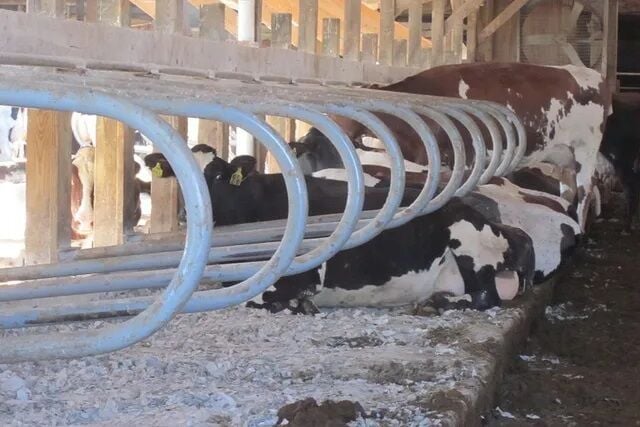Two ponies died and a child lost consciousness in a recent incident that experts say highlights the dangers of manure agitation.
Hydrogen sulfide gas was released when a manure pit was being agitated in September in Mifflin County, Pennsylvania, according to Eileen Fabian, a Penn State ag engineering professor.
The poisonous gas overwhelmed the ponies, as well as a young boy who was watching his father agitate the pit. The boy was revived after CPR was performed.
Fabian said hydrogen sulfide is present in manure when farms use gypsum bedding and is usually found in elevated levels in liquid manure.
Despite being stored in open-air pits, the crust that develops on the surface of the manure traps the gas, she said, and when agitated prior to spreading, the gas is released.

Dairy cows rest in a freestall barn with gypsum bedding. Gypsum in manure can generate hydrogen sulfide gas, and the levels can increase during storage in an open-air pit.
Hydrogen sulfide has been a risk for years, but incidents have declined since Penn State began extensive research on the issue and launched a public awareness campaign on the danger.
“In 2012, there were deaths in Pennsylvania and Maryland from open-air storage being agitated. A team from Penn State found the connection with gypsum — which is calcium sulfate, which is the sulfur source,” Fabian said.
Gypsum bedding is often a recycled product made from drywall or other materials.
It is beneficial to dairy farms because it is absorbent and antibacterial, which can reduce the occurrence of mastitis.
Sulfate in manure can also be a result of poor water quality (high sulfur) or animal feed ingredients.
Hydrogen sulfide gas presents a unique risk, Fabian said, since it is heavier than air and floats close to the ground, making livestock and children particularly vulnerable.
Eric Rickenbach, a Berks County instructor in silo emergencies who has dealt extensively with silo gas, said he has heard of several incidents involving hydrogen sulfide in manure over the years.
One of the earliest was an incident in Montour County when a dairy manure pit was being agitated and two boys about 15 feet away passed out. They both survived, Rockenbach said.
Another incident occurred on a farm outside of Lititz when a reception pit for heifer pens was being pumped into the main manure storage facility.
When the pump was turned on, Rickenbach said, a few heifers standing near the grate died almost immediately.
“After the incident, we went to the farm and put our meters by the pit, and they went into alarm right away once the pump started to agitate,” he said.
Now that most crops have been harvested and manure spreading season is underway, Fabian said farmers need to be reminded of the risks associated with gases found in manure.
As manure breaks down, it creates a poisonous gas that can be fatal to farmers who don’t take safety precautions when working in the area. Here’s everything you’ll need to create a manure pit safety plan.
Those using gypsum bedding should be extra cautious, she said. All people and livestock should remain at least 50 feet away.
“For the first 30 to 60 minutes of agitation, when that crust is broken in the manure, the gas is going to be released,” Fabian said.
While hydrogen sulfide gas has a rotten egg smell, the odor is undetectable at dangerous levels or after extensive exposure.
For the person operating the pump or other equipment to agitate the pit, Fabian recommended using a meter to monitor gas levels.
“A lot of manure haulers carry them,” Fabian said. “And even if you’re in a cab tractor it might be safer, but I would still carry a meter because fresh air does come inside.”
While the greatest risk for hydrogen sulfide gas seems to be with liquid dairy manure stored in a pit, Fabian said the gas can still be present in drier manure containing gypsum bedding.
She recalled an incident where manure with gypsum bedding was sitting in the gutter inside a tie stall barn. When the barn cleaner was started, there was a release of hydrogen sulfide gas.
Fabian said the hog industry has been dealing with the risk of hydrogen sulfide gas for decades, and safety precautions are well established.
Still, reminders are needed — especially in the dairy industry — where storage pits and gypsum bedding are used.
“Whenever you agitate any manure storage, there are gases that can come off of it,” Fabian said. “Gypsum bedding has benefits, and we’re not telling people to stop using it. Just be careful.”





